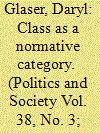|
|
|
Sort Order |
|
|
|
Items / Page
|
|
|
|
|
|
|
| Srl | Item |
| 1 |
ID:
078568


|
|
|
|
|
| Publication |
2007.
|
| Summary/Abstract |
Black Economic Empowerment (BEE) is an attempt to marry redistributive and neo-liberal economic policies. The South African state, however, has differing degrees of power to force redistribution on different sectors of the economy. Fisheries is one of the sectors where state allocation of licenses, exploitation rights and quotas makes the prospects for BEE promising. In this article, we examine redistributive processes in the hake trawl industry. We conclude that BEE, despite its redistributive intentions, has been doubly conducive to the interests of large-scale South African capital. To begin with, it has by and large confirmed the historical share of fishing rights to incumbent, largely white-controlled, operators. Second, it has created a layer of 'black captains of industry' to whom incumbents are increasingly outsourcing primary production in a volatile, high-risk and currently loss-leading sector. While fishing operations are being outsourced under the banner of redistribution, the fish trade remains under the effective control of white capital.
|
|
|
|
|
|
|
|
|
|
|
|
|
|
|
|
| 2 |
ID:
100273


|
|
|
|
|
| Publication |
2010.
|
| Summary/Abstract |
Race and sex/gender are commonly argued to deserve equal priority with class oppression in egalitarian politics. However, placing race and sex in the same list as what is here termed "standard-of-living class" constitutes a category error. Standard of living, alongside power and status, belongs to a distinctive list of "metrics of hierarchy" that should be accorded priority in an important respect: in the specification of the hierarchies (or "distribution strata") that egalitarians seek ultimately to eliminate or reduce. Race and sex, along with other "differentiators," matter primarily for the way they are "used" by social arrangements (e.g., apartheid, patriarchy, capitalism) to assign persons to places in hierarchies of living standard, power, and status. Examining policies to promote black capitalism in post-apartheid South Africa, the author shows how the conflation of differentiators (race, in this case) and distribution strata (like standard-of-living class) is complicit in justifying multiracialized inequality.
|
|
|
|
|
|
|
|
|
|
|
|
|
|
|
|
|
|
|
|
|